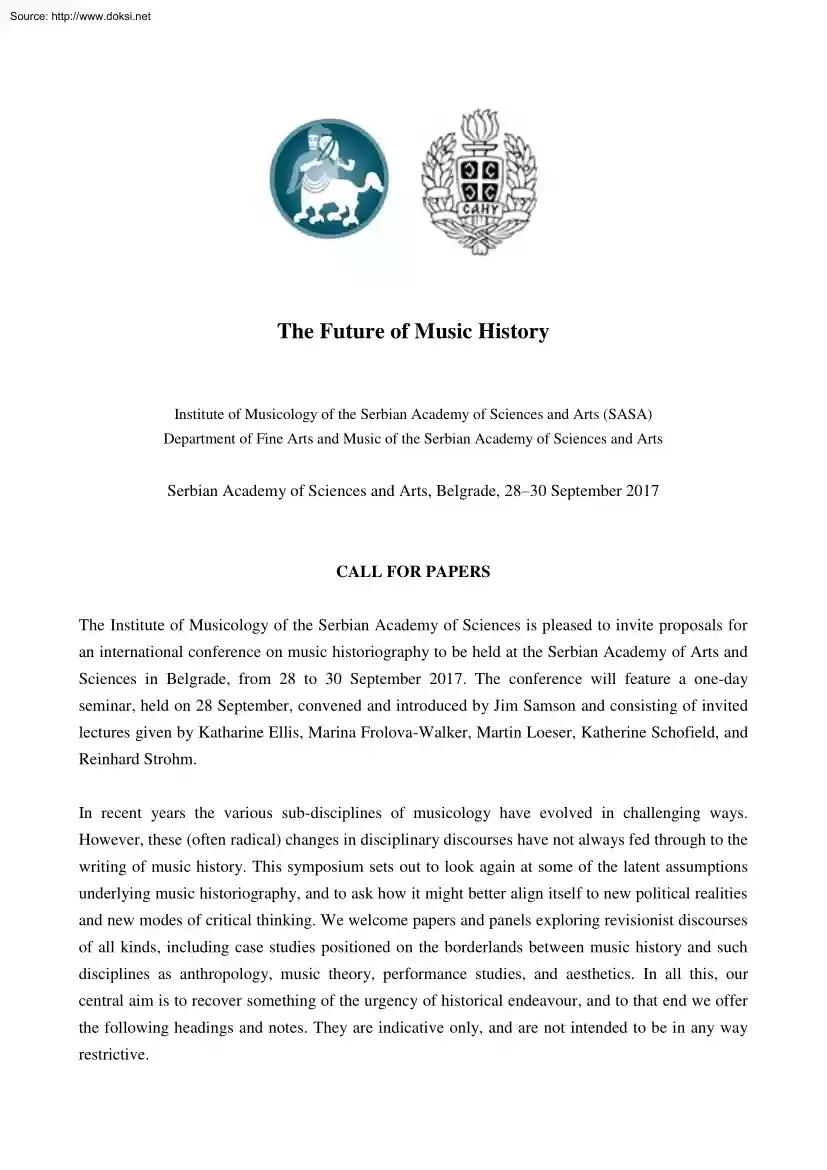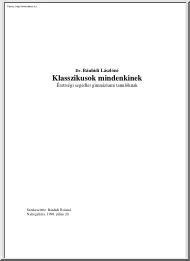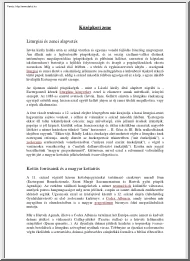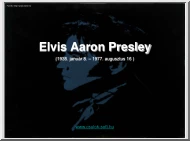Datasheet
Year, pagecount:2017, 3 page(s)
Language:English
Downloads:2
Uploaded:April 09, 2018
Size:580 KB
Institution:
-
Comments:
Institute of Musicology of the Serbian Academy of Sciences and Arts
Attachment:-
Download in PDF:Please log in!
Comments
No comments yet. You can be the first!
Most popular documents in this category
Content extract
Source: http://www.doksinet The Future of Music History Institute of Musicology of the Serbian Academy of Sciences and Arts (SASA) Department of Fine Arts and Music of the Serbian Academy of Sciences and Arts Serbian Academy of Sciences and Arts, Belgrade, 28–30 September 2017 CALL FOR PAPERS The Institute of Musicology of the Serbian Academy of Sciences is pleased to invite proposals for an international conference on music historiography to be held at the Serbian Academy of Arts and Sciences in Belgrade, from 28 to 30 September 2017. The conference will feature a one-day seminar, held on 28 September, convened and introduced by Jim Samson and consisting of invited lectures given by Katharine Ellis, Marina Frolova-Walker, Martin Loeser, Katherine Schofield, and Reinhard Strohm. In recent years the various sub-disciplines of musicology have evolved in challenging ways. However, these (often radical) changes in disciplinary discourses have not always fed through to the writing of
music history. This symposium sets out to look again at some of the latent assumptions underlying music historiography, and to ask how it might better align itself to new political realities and new modes of critical thinking. We welcome papers and panels exploring revisionist discourses of all kinds, including case studies positioned on the borderlands between music history and such disciplines as anthropology, music theory, performance studies, and aesthetics. In all this, our central aim is to recover something of the urgency of historical endeavour, and to that end we offer the following headings and notes. They are indicative only, and are not intended to be in any way restrictive. Source: http://www.doksinet 1. Towards a post-European history of music How might music history address the challenge represented by the cultural relativism implicit in many anthropological studies? Is it feasible to devise explanatory frameworks that embrace the histories of multiple different
cultures? How do we circumvent the danger of ‘speaking for’ non-European cultures from a European perspective? 2. De-nationalizing music histories Might we challenge the practice of writing national histories of music, and explore instead the commonalities that arise from shared cultural substrata, common imperial legacies, the lure of modernity, and (paradoxically) the rise of nationalism itself? Might we explore more fully a historiography of periphery, acknowledging chauvinism where we find it? And within national histories themselves, might we liberate the regions at the expense of the charismatic cultural capitals, and do adequate justice to mobility and migration flows? 3. Performance as/in history Although the rise of Performance Studies has helped liberate performance from the paradigm of interpretation, music histories still tend to place works and institutions centre stage. Should performance play a more significant role in music historiography? And if so, might not other
elements shift around somewhat, notably gender and place? A swerve towards performance raises a further important question, currently addressed by several ethnomusicologists. How should music history address and accommodate music that has been disseminated very largely through oral tradition, including nonEuropean art musics, traditional agrarian repertories and popular music? 4. Everyday history From the 1970s onwards a number of historians have developed a conception of historiography that has been labelled ‘everyday history’ [Alltagsgeschichte], and there are signs that this is increasingly penetrating the writing of music history. Might there be a further shift of emphasis from a history grounded in human consciousness to one grounded in human communication, concerned with motivations and agency, and placing the spotlight firmly on the consumer and her/his daily routines, experiences and ideas? The official language of the conference is English. Proposals (of no more than 400
words) for 20minute papers and short biographical notes (of up to 200 words) should be sent both to Srđan Source: http://www.doksinet Atanasovski (srdjanatanasovski@yahoo.couk) and Melita Milin (melita milin@yahoocom) by 15 February 2017 (receipt of proposals will be acknowledged by e-mail). We also encourage panel proposals; please provide a short description of the session in addition to individual abstracts and biographical notes. Proposals will be reviewed by the conference committee and the results will be announced by 15 March 2017. A selection of papers will be considered for publication either in an edited volume or in the journal Musicology. Conference fee: 50 Euros (students are exempted) Programme Committee: Dejan Despić Jim Samson Katherine Schofield Katy Romanou Helmut Loos Jernej Weiss Melita Milin Katarina Tomašević Jelena Jovanović Ivana Medić Srđan Atanasovski Organisational Committee: Vesna Peno Biljana Milanović Marija Dumnić
music history. This symposium sets out to look again at some of the latent assumptions underlying music historiography, and to ask how it might better align itself to new political realities and new modes of critical thinking. We welcome papers and panels exploring revisionist discourses of all kinds, including case studies positioned on the borderlands between music history and such disciplines as anthropology, music theory, performance studies, and aesthetics. In all this, our central aim is to recover something of the urgency of historical endeavour, and to that end we offer the following headings and notes. They are indicative only, and are not intended to be in any way restrictive. Source: http://www.doksinet 1. Towards a post-European history of music How might music history address the challenge represented by the cultural relativism implicit in many anthropological studies? Is it feasible to devise explanatory frameworks that embrace the histories of multiple different
cultures? How do we circumvent the danger of ‘speaking for’ non-European cultures from a European perspective? 2. De-nationalizing music histories Might we challenge the practice of writing national histories of music, and explore instead the commonalities that arise from shared cultural substrata, common imperial legacies, the lure of modernity, and (paradoxically) the rise of nationalism itself? Might we explore more fully a historiography of periphery, acknowledging chauvinism where we find it? And within national histories themselves, might we liberate the regions at the expense of the charismatic cultural capitals, and do adequate justice to mobility and migration flows? 3. Performance as/in history Although the rise of Performance Studies has helped liberate performance from the paradigm of interpretation, music histories still tend to place works and institutions centre stage. Should performance play a more significant role in music historiography? And if so, might not other
elements shift around somewhat, notably gender and place? A swerve towards performance raises a further important question, currently addressed by several ethnomusicologists. How should music history address and accommodate music that has been disseminated very largely through oral tradition, including nonEuropean art musics, traditional agrarian repertories and popular music? 4. Everyday history From the 1970s onwards a number of historians have developed a conception of historiography that has been labelled ‘everyday history’ [Alltagsgeschichte], and there are signs that this is increasingly penetrating the writing of music history. Might there be a further shift of emphasis from a history grounded in human consciousness to one grounded in human communication, concerned with motivations and agency, and placing the spotlight firmly on the consumer and her/his daily routines, experiences and ideas? The official language of the conference is English. Proposals (of no more than 400
words) for 20minute papers and short biographical notes (of up to 200 words) should be sent both to Srđan Source: http://www.doksinet Atanasovski (srdjanatanasovski@yahoo.couk) and Melita Milin (melita milin@yahoocom) by 15 February 2017 (receipt of proposals will be acknowledged by e-mail). We also encourage panel proposals; please provide a short description of the session in addition to individual abstracts and biographical notes. Proposals will be reviewed by the conference committee and the results will be announced by 15 March 2017. A selection of papers will be considered for publication either in an edited volume or in the journal Musicology. Conference fee: 50 Euros (students are exempted) Programme Committee: Dejan Despić Jim Samson Katherine Schofield Katy Romanou Helmut Loos Jernej Weiss Melita Milin Katarina Tomašević Jelena Jovanović Ivana Medić Srđan Atanasovski Organisational Committee: Vesna Peno Biljana Milanović Marija Dumnić





